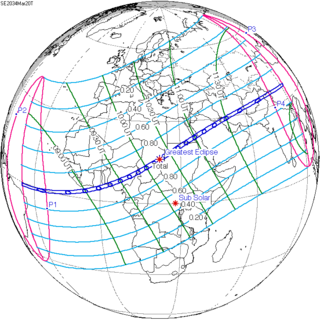Solar eclipse of March 20, 2034
| Solar eclipse of March 20, 2034 | |
|---|---|
| Type of eclipse | |
| Nature | Total |
| Gamma | 0.2894 |
| Magnitude | 1.0458 |
| Maximum eclipse | |
| Duration | 249 s (4 min 9 s) |
| Coordinates | 16°06′N 22°12′E / 16.1°N 22.2°E |
| Max. width of band | 159 km (99 mi) |
| Times (UTC) | |
| Greatest eclipse | 10:18:45 |
| References | |
| Saros | 130 (53 of 73) |
| Catalog # (SE5000) | 9583 |
A total solar eclipse will occur at the Moon's descending node of orbit on Monday, March 20, 2034,[1] with a magnitude of 1.0458. A solar eclipse occurs when the Moon passes between Earth and the Sun, thereby totally or partly obscuring the image of the Sun for a viewer on Earth. A total solar eclipse occurs when the Moon's apparent diameter is larger than the Sun's, blocking all direct sunlight, turning day into darkness. Totality occurs in a narrow path across Earth's surface, with the partial solar eclipse visible over a surrounding region thousands of kilometres wide. Occurring about 1.3 days before perigee (on March 21, 2034, at 18:15 UTC), the Moon's apparent diameter will be larger.[2]
Totality will be visible from Nigeria, northern Cameroon, Chad, Sudan, Egypt, Saudi Arabia, Kuwait, Iran, Afghanistan, Pakistan, northern India, and western China.[3] A partial eclipse will be visible for parts of eastern Brazil, Africa, Europe, the Middle East, Central Asia, and South Asia. Coincidentally, The eclipse passes through many Islamic countries around the date of Islamic New Year (estimated around March 20–21 according to local traditions, time zone and atmospheric conditions), and also passes through Iran only a few hours before the vernal equinox, marking the beginning of the Persian New Year. Since the Islamic lunar year is 11–12 days shorter than the solar year that the Iranian calendar observes, the Islamic New Year rotates through the seasons of the year, while the Persian one is on nearly fixed date on Gregorian calendar. It is an extremely rare case that the two new years meet.
Images
[edit]Details of totality in some places or cities
[edit]| Country or Territory | Place or City | Start
of |
Start of total eclipse (Local Time) |
End of total eclipse (Local Time) |
Duration of total eclipse |
End of partial eclipse (Local Time) |
Magnitude |
|---|---|---|---|---|---|---|---|
| Akraké | 09:01:11 | 10:17:36 | 10:18:57 | 1 min 51 s | 11:45:51 | 1,042 | |
| Lagos | 09:02:04 | 10:18:23 | 10:21:02 | 2 min 39 s | 11:47:45 | 1,042 | |
| Ikorodu | 09:02:23 | 10:19:01 | 10:21:15 | 2 min 15s | 11:48:17 | 1,042 | |
| Ondo Town | 09:04:23 | 10:22:02 | 10:24:44 | 2 min 43 s | 11:52:25 | 1,043 | |
| Benin City | 09:04:36 | 10:22:44 | 10:24:58 | 2 min 14 s | 11:53:15 | 1,043 | |
| Akure | 09:05:11 | 10:22:57 | 10:25:42 | 2 min 44 s | 11:53:35 | 1,043 | |
| Makurdi | 09:10:12 | 10:30:39 | 10:33:05 | 2 min 26 s | 12:02:58 | 1,044 | |
| Lafia | 09:11:12 | 10:31:12 | 10:34:49 | 3 min 37 s | 12:04:10 | 1,044 | |
| Gombe | 09:17:38 | 10:40:19 | 10:42:52 | 2 min 33 s | 12:13:51 | 1,044 | |
| Mubi | 09:20:58 | 10:44:51 | 10:47:53 | 3 min 02 s | 12:19:57 | 1,045 | |
| Mokolo | 09:22:25 | 10:46:36 | 10:50:11 | 3 min 35 s | 12:21:26 | 1,045 | |
| Maroua | 09:23:16 | 10:48:38 | 10:50:07 | 1 min 29 s | 12:22:31 | 1,045 | |
| N'Djamena | 09:26:50 | 10:51:41 | 10:55:27 | 3 min 45 s | 12:26:43 | 1,045 | |
| Biltine | 09:41:55 | 11:10:53 | 11:12:50 | 1 min 57 s | 12:44:43 | 1,046 | |
| Abri | 11:12:58 | 12:42:02 | 12:46:03 | 4 min 01 s | 14:11:53 | 1,045 | |
| Wadi Halfa | 11:16:55 | 12:46:00 | 12:49:19 | 3 min 20 s | 14:14:35 | 1,045 | |
| Shalateen | 11:28:41 | 12:56:52 | 13:00:11 | 3 min 19 s | 14:22:45 | 1,044 | |
| Yanbu | 12:35:54 | 14:03:35 | 14:05:58 | 2 min 23 s | 15:27:11 | 1,044 | |
| Hafar Al Batin | 12:58:28 | 14:21:18 | 14:23:31 | 2 min 12 s | 15:38:34 | 1,042i | |
| Wafra | 13:03:10 | 14:24:25 | 14:27:37 | 3 min 12 s | 15:40:52 | 1,041 | |
| Mangaf | 13:03:38 | 14:25:09 | 14:27:18 | 2 min 09 s | 15:40:53 | 1,041 | |
| Khafji | 13:03:53 | 14:25:10 | 14:28:03 | 2 min 52 s | 15:41:16 | 1,041 | |
| Bushehr | 13:39:05 | 14:59:16 | 15:01:29 | 2 min 13 s | 16:13:30 | 1,041 | |
| Shiraz | 13:42:53 | 15:01:44 | 15:34:15 | 2 min 30 s | 16:14:58 | 1,040 | |
| Rafsanjan | 13:49:44 | 15:06:37 | 15:08:37 | 2 min 00 s | 16:17:28 | 1,039 | |
| Farah | 15:00:27 | 16:13:04 | 16:15:29 | 2 min 35 s | 17:20:32 | 1,037 | |
| Ghazni | 15:09:19 | 16:18:26 | 16:20:19 | 1 min 53 s | 17:22:28 | 1,035 | |
| Jost | 15:11:13 | 16:19:24 | 16:21:38 | 2 m 14 s | 17:22:57 | 1,035 | |
| Peshawar | 15:43:00 | 16:50:31 | 16:52:08 | 1 min 38 s | 17:52:59 | 1,035 | |
| Mardan | 15:43:32 | 16:51:10 | 16:51:57 | 47 s | 17:52:59 | 1,034 | |
| Wah | 15:44:23 | 16:51:03 | 16:53:13 | 2 min 10 s | 17:53:18 | 1,034 | |
| Islamabad | 15:44:44 | 16:51:17 | 16:53:24 | 2 min 07 s | 17:53:23 | 1,034 | |
| Rawalpindi | 15:44:45 | 16:51:24 | 16:53:22 | 1 min 58 s | 17:53:26 | 1,034 | |
| Abbottabad | 15:44:50 | 16:51:27 | 16:53:03 | 1 min 36 s | 17:53:11 | 1,034 | |
| Srinagar, Jammu and Kashmir Region | 16:16:29 | 17:22:07 | 17:24:10 | 2 min 03 s | 18:23:25 | 1,034 | |
| Leh, Ladakh Region | 16:19:08 | 17:23:25 | 17:25:24 | 1 min 59 s | 18:53:34 | 1,033 | |
| Rutog County, Tibet Autonomous Region | 18:51:23 | 19:54:22 | 19:56:11 | 1 min 39 s | 20:45:47 (sunset) | 1,032 |
Eclipse details
[edit]Shown below are two tables displaying details about this particular solar eclipse. The first table outlines times at which the moon's penumbra or umbra attains the specific parameter, and the second table describes various other parameters pertaining to this eclipse.[4]
| Event | Time (UTC) |
|---|---|
| First Penumbral External Contact | 2034 March 20 at 07:41:11.9 UTC |
| First Umbral External Contact | 2034 March 20 at 08:38:09.7 UTC |
| First Central Line | 2034 March 20 at 08:38:58.0 UTC |
| First Umbral Internal Contact | 2034 March 20 at 08:39:46.4 UTC |
| First Penumbral Internal Contact | 2034 March 20 at 09:41:21.7 UTC |
| Ecliptic Conjunction | 2034 March 20 at 10:15:45.2 UTC |
| Greatest Eclipse | 2034 March 20 at 10:18:45.2 UTC |
| Greatest Duration | 2034 March 20 at 10:19:41.8 UTC |
| Equatorial Conjunction | 2034 March 20 at 10:28:24.9 UTC |
| Last Penumbral Internal Contact | 2034 March 20 at 10:55:53.9 UTC |
| Last Umbral Internal Contact | 2034 March 20 at 11:57:34.8 UTC |
| Last Central Line | 2034 March 20 at 11:58:24.9 UTC |
| Last Umbral External Contact | 2034 March 20 at 11:59:14.9 UTC |
| Last Penumbral External Contact | 2034 March 20 at 12:56:10.5 UTC |
| Parameter | Value |
|---|---|
| Eclipse Magnitude | 1.04582 |
| Eclipse Obscuration | 1.09374 |
| Gamma | 0.28942 |
| Sun Right Ascension | 23h59m32.7s |
| Sun Declination | -00°02'58.0" |
| Sun Semi-Diameter | 16'03.7" |
| Sun Equatorial Horizontal Parallax | 08.8" |
| Moon Right Ascension | 23h59m11.3s |
| Moon Declination | +00°13'42.6" |
| Moon Semi-Diameter | 16'31.6" |
| Moon Equatorial Horizontal Parallax | 1°00'39.3" |
| ΔT | 75.7 s |
Eclipse season
[edit]This eclipse is part of an eclipse season, a period, roughly every six months, when eclipses occur. Only two (or occasionally three) eclipse seasons occur each year, and each season lasts about 35 days and repeats just short of six months (173 days) later; thus two full eclipse seasons always occur each year. Either two or three eclipses happen each eclipse season. In the sequence below, each eclipse is separated by a fortnight.
| March 20 Descending node (new moon) |
April 3 Ascending node (full moon) |
|---|---|
 |

|
| Total solar eclipse Solar Saros 130 |
Penumbral lunar eclipse Lunar Saros 142 |
Related eclipses
[edit]Eclipses in 2034
[edit]- A total solar eclipse on March 20.
- A penumbral lunar eclipse on April 3.
- An annular solar eclipse on September 12.
- A partial lunar eclipse on September 28.
Metonic
[edit]- Preceded by: Solar eclipse of June 1, 2030
- Followed by: Solar eclipse of January 5, 2038
Tzolkinex
[edit]- Preceded by: Solar eclipse of February 6, 2027
- Followed by: Solar eclipse of April 30, 2041
Half-Saros
[edit]- Preceded by: Lunar eclipse of March 14, 2025
- Followed by: Lunar eclipse of March 25, 2043
Tritos
[edit]- Preceded by: Solar eclipse of April 20, 2023
- Followed by: Solar eclipse of February 16, 2045
Solar Saros 130
[edit]- Preceded by: Solar eclipse of March 9, 2016
- Followed by: Solar eclipse of March 30, 2052
Inex
[edit]- Preceded by: Solar eclipse of April 8, 2005
- Followed by: Solar eclipse of February 28, 2063
Triad
[edit]- Preceded by: Solar eclipse of May 20, 1947
- Followed by: Solar eclipse of January 19, 2121
Solar eclipses of 2033–2036
[edit]This eclipse is a member of a semester series. An eclipse in a semester series of solar eclipses repeats approximately every 177 days and 4 hours (a semester) at alternating nodes of the Moon's orbit.[5]
The partial solar eclipse on July 23, 2036 occurs in the next lunar year eclipse set.
| Solar eclipse series sets from 2033 to 2036 | ||||||
|---|---|---|---|---|---|---|
| Descending node | Ascending node | |||||
| Saros | Map | Gamma | Saros | Map | Gamma | |
| 120 | March 30, 2033 Total |
0.9778 | 125 | September 23, 2033 Partial |
−1.1583 | |
| 130 | March 20, 2034 Total |
0.2894 | 135 | September 12, 2034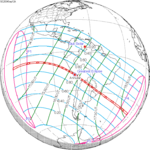 Annular |
−0.3936 | |
| 140 | March 9, 2035 Annular |
−0.4368 | 145 | September 2, 2035 Total |
0.3727 | |
| 150 | February 27, 2036 Partial |
−1.1942 | 155 | August 21, 2036 Partial |
1.0825 | |
Saros 130
[edit]This eclipse is a part of Saros series 130, repeating every 18 years, 11 days, and containing 73 events. The series started with a partial solar eclipse on August 20, 1096. It contains total eclipses from April 5, 1475 through July 18, 2232. There are no annular or hybrid eclipses in this set. The series ends at member 73 as a partial eclipse on October 25, 2394. Its eclipses are tabulated in three columns; every third eclipse in the same column is one exeligmos apart, so they all cast shadows over approximately the same parts of the Earth.
The longest duration of totality was produced by member 30 at 6 minutes, 41 seconds on July 11, 1619. All eclipses in this series occur at the Moon’s descending node of orbit.[6]
| Series members 41–62 occur between 1801 and 2200: | ||
|---|---|---|
| 41 | 42 | 43 |
 November 9, 1817 |
 November 20, 1835 |
 November 30, 1853 |
| 44 | 45 | 46 |
 December 12, 1871 |
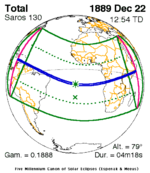 December 22, 1889 |
 January 3, 1908 |
| 47 | 48 | 49 |
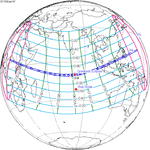 January 14, 1926 |
 January 25, 1944 |
 February 5, 1962 |
| 50 | 51 | 52 |
 February 16, 1980 |
 February 26, 1998 |
 March 9, 2016 |
| 53 | 54 | 55 |
 March 20, 2034 |
 March 30, 2052 |
 April 11, 2070 |
| 56 | 57 | 58 |
 April 21, 2088 |
 May 3, 2106 |
 May 14, 2124 |
| 59 | 60 | 61 |
 May 25, 2142 |
 June 4, 2160 |
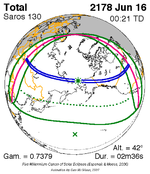 June 16, 2178 |
| 62 | ||
 June 26, 2196 | ||
Metonic series
[edit]The metonic series repeats eclipses every 19 years (6939.69 days), lasting about 5 cycles. Eclipses occur in nearly the same calendar date. In addition, the octon subseries repeats 1/5 of that or every 3.8 years (1387.94 days). All eclipses in this table occur at the Moon's descending node.
| 22 eclipse events between June 1, 2011 and October 24, 2098 | ||||
|---|---|---|---|---|
| May 31–June 1 | March 19–20 | January 5–6 | October 24–25 | August 12–13 |
| 118 | 120 | 122 | 124 | 126 |
 June 1, 2011 |
 March 20, 2015 |
 January 6, 2019 |
 October 25, 2022 |
 August 12, 2026 |
| 128 | 130 | 132 | 134 | 136 |
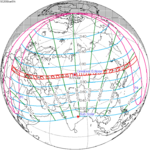 June 1, 2030 |
 March 20, 2034 |
 January 5, 2038 |
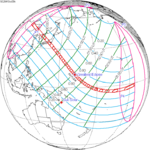 October 25, 2041 |
 August 12, 2045 |
| 138 | 140 | 142 | 144 | 146 |
 May 31, 2049 |
 March 20, 2053 |
 January 5, 2057 |
 October 24, 2060 |
 August 12, 2064 |
| 148 | 150 | 152 | 154 | 156 |
 May 31, 2068 |
 March 19, 2072 |
 January 6, 2076 |
 October 24, 2079 |
 August 13, 2083 |
| 158 | 160 | 162 | 164 | |
 June 1, 2087 |
 October 24, 2098 | |||
Tritos series
[edit]This eclipse is a part of a tritos cycle, repeating at alternating nodes every 135 synodic months (≈ 3986.63 days, or 11 years minus 1 month). Their appearance and longitude are irregular due to a lack of synchronization with the anomalistic month (period of perigee), but groupings of 3 tritos cycles (≈ 33 years minus 3 months) come close (≈ 434.044 anomalistic months), so eclipses are similar in these groupings.
| Series members between 1801 and 2200 | ||||
|---|---|---|---|---|
 January 1, 1805 (Saros 109) |
 October 31, 1826 (Saros 111) |
 August 28, 1848 (Saros 113) | ||
 July 29, 1859 (Saros 114) |
 June 28, 1870 (Saros 115) |
 May 27, 1881 (Saros 116) |
 April 26, 1892 (Saros 117) |
 March 29, 1903 (Saros 118) |
 February 25, 1914 (Saros 119) |
 January 24, 1925 (Saros 120) |
 December 25, 1935 (Saros 121) |
 November 23, 1946 (Saros 122) |
 October 23, 1957 (Saros 123) |
 September 22, 1968 (Saros 124) |
 August 22, 1979 (Saros 125) |
 July 22, 1990 (Saros 126) |
 June 21, 2001 (Saros 127) |
 May 20, 2012 (Saros 128) |
 April 20, 2023 (Saros 129) |
 March 20, 2034 (Saros 130) |
 February 16, 2045 (Saros 131) |
 January 16, 2056 (Saros 132) |
 December 17, 2066 (Saros 133) |
 November 15, 2077 (Saros 134) |
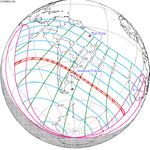 October 14, 2088 (Saros 135) |
 September 14, 2099 (Saros 136) |
 August 15, 2110 (Saros 137) |
 July 14, 2121 (Saros 138) |
 June 13, 2132 (Saros 139) |
 May 14, 2143 (Saros 140) |
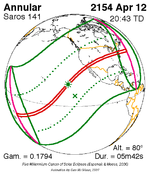 April 12, 2154 (Saros 141) |
 March 12, 2165 (Saros 142) |
 February 10, 2176 (Saros 143) |
 January 9, 2187 (Saros 144) |
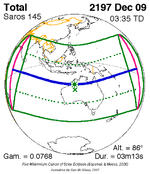 December 9, 2197 (Saros 145) | |||
Inex series
[edit]This eclipse is a part of the long period inex cycle, repeating at alternating nodes, every 358 synodic months (≈ 10,571.95 days, or 29 years minus 20 days). Their appearance and longitude are irregular due to a lack of synchronization with the anomalistic month (period of perigee). However, groupings of 3 inex cycles (≈ 87 years minus 2 months) comes close (≈ 1,151.02 anomalistic months), so eclipses are similar in these groupings.
| Series members between 1801 and 2200 | ||
|---|---|---|
 August 28, 1802 (Saros 122) |
 August 7, 1831 (Saros 123) |
 July 18, 1860 (Saros 124) |
 June 28, 1889 (Saros 125) |
 June 8, 1918 (Saros 126) |
 May 20, 1947 (Saros 127) |
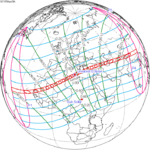 April 29, 1976 (Saros 128) |
 April 8, 2005 (Saros 129) |
 March 20, 2034 (Saros 130) |
 February 28, 2063 (Saros 131) |
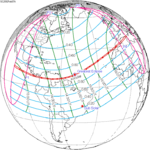 February 7, 2092 (Saros 132) |
 January 19, 2121 (Saros 133) |
 December 30, 2149 (Saros 134) |
 December 9, 2178 (Saros 135) |
|
References
[edit]- ^ "March 20, 2034 Total Solar Eclipse". timeanddate. Retrieved 14 August 2024.
- ^ "Moon Distances for London, United Kingdom, England". timeanddate. Retrieved 14 August 2024.
- ^ "Total Solar Eclipse on March 20, 2034: Path Map and Times". www.timeanddate.com. Retrieved 2024-04-19.
- ^ "Total Solar Eclipse of 2034 Mar 20". EclipseWise.com. Retrieved 14 August 2024.
- ^ van Gent, R.H. "Solar- and Lunar-Eclipse Predictions from Antiquity to the Present". A Catalogue of Eclipse Cycles. Utrecht University. Retrieved 6 October 2018.
- ^ "NASA - Catalog of Solar Eclipses of Saros 130". eclipse.gsfc.nasa.gov.

